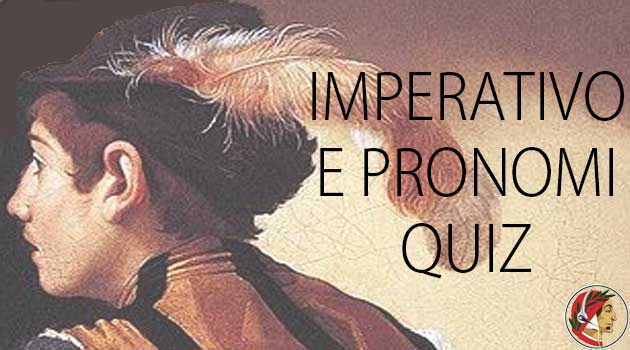We can combine the imperativo with pronouns in a single word. Learn the most common scenarios and solve the quiz at the bottom of this post.
LEVEL: Intermediate.
I recently wrote a post about the Italian imperativo with simple audio examples. I
| IMPERATIVO | parlare | correre | aprire | finire |
|---|---|---|---|---|
| tu | parla | corri | apri | finisci |
| noi | parliamo | corriamo | apriamo | finiamo |
| voi | parlate | correte | aprite | finite |
| tu (negativo) | non parlare | non correre | non aprire | non finire |
So, the imperativo, or giving orders in Italian, is basically very similar to the presente indicativo, (with the exception of -ARE –> (TU) PARLA instead of (TU) PARLI).
The negative imperativo of NOI & VOI is NON + IMPERATIVO. Non parlate.
The negative imperativo of TU is NON + infinitive= Non parlare, “don’t speak”.
Conjugations with the imperative are quite limited, since we can give orders only to TU, NOI and VOI. We can combine the imperativo with any pronouns – direct object, indirect object, CI & NE – as follows:
- Prendi il telefono –> PRENDILO
- Finisci i compiti –> FINISCILI
- Dai i soldi a Lucia –> DAGLIELI
- Regala la bicicletta a Dario –> REGALAGLIELA
- Aiutiamo le tue amiche –> AIUTIAMOLE
- Dite a Francesca di venire –> DITEGLIELO
- Compra le sigarette per me –> COMPRAMELE
- Porta i bambini al cinema –> PORTACELI
- Assaggia una fetta di torta –> ASSAGGIANE UNA FETTA
In some of the examples above, we can see how direct and indirect pronouns merge together with the imperativo to create a single word . e.g DAGLIELI.
The following verbs can have an irregular imperative with TU.
| andare | dare | dire | fare | stare | |
| TU | vai (va’) | dai (da’) | di’ | fai (fa’) | sati (sta’) |
When combined with some pronouns there’s a duplication of consonants. For example:
- Vai al mercato –> VACCI
- Dai a me i soldi –> DAMMI I SOLDI –> DAMMELI
- Dai a me le chiiavi –> DAMMI LE CHIAVI –>DAMMELE
- Di’ a noi cosa pensi –> DICCI COSA PENSI –> DICCELO
- Fai il tuo lavoro –> FALLO
- Fai a noi un piacere –> FACCI UN PIACERE –>FACCELO
- Stai a casa –> STACCI
The negative imperative with TU is NON + INFINITO. The infinito has the same property of the imperativo. It can be combined with pronouns. Alternatively, we can put the pronoun before the verb. For example:
- Non salutare Luigi –> Non salutarlo = Non lo salutare.
- Non bere la birra –> Non berla = Non la bere.
- Non comprare la moto a Davide –> Non comprargliela = Non gliela comprare.
- Non dare i soldi a loro –> Non darglieli –> Non glieli dare.
LEI & LORO
The imperativo of the formal tu = Lei and Loro is in fact a form of congiuntivo presente. Pronouns do not merge with the verbs.
LEI
- Vada a casa –> Ci vada.
- Mi saluti Suo marito –> Me lo saluti.
- Prenda il mio ombrello –> Lo prenda.
LORO
- Vadano a casa –> Ci vadano.
- Bevano tutti del vino –> Ne bevano tutti.
- Prendano il treno –> Lo prendano.
Thanks for reading. Please read more in the quiz. Alla prossima!
Quiz-summary
0 of 5 questions completed
Questions:
- 1
- 2
- 3
- 4
- 5
Information
LOADING QUIZ…
You have already completed the quiz before. Hence you can not start it again.
Quiz is loading...
Free Italian Quiz
"Imperativo e pronomi: Italian imperative and pronouns: QUIZ"
Sign up for free to try this quiz and get early access to new Italian lessons before anyone else.
You have to finish following quiz, to start this quiz:
Results
Time has elapsed
You scored 0 out of 0 points, (0)
| Average score |
|
| Your score |
|
Categories
- Not categorized 0%
-
[contact-form-7 id=”15171″ title=”trial due colonne”]
- 1
- 2
- 3
- 4
- 5
- Answered
- Review
-
Question 1 of 5
1. Question
Drag & Drop
Combine situations and the appropriate imperativo of the verb prendere.
e.g. Vuoi una birra –> Prendila
Sort elements
- Prendiamole
- Prendetela
- Prendilo
- Lo prenda
- prendetele
-
Vogliamo delle patatine.
-
Volete una macchina nuova.
-
Vuoi un gelato
-
Signora, vuole un caffè?
-
Volete le vostre valigie
Correct
In red, your errors.
✅ Check your answers
↓↓↓
Incorrect
In red, your errors.
✅ Check your answers
↓↓↓
-
Question 2 of 5
2. Question
Drag & Drop
Combine situations and the appropriate imperativo of the verbs DIREor DARE.
Devi dire a Mario di venire —> Diglielo
Sort elements
- Diciamoglielo
- Dagliele
- Glielo dica
- Glielo dia
- Dammela
- Diamoglielo
-
Dobbiamo dire a Stefano di aspettarci.
-
Devi dare le chiavi a mio padre.
-
Signora, deve dire ai suoi figli di studiare.
-
Signor Rossi, deve dare il telefono a sua moglie.
-
Devi dare a me la tua bicicletta.
-
Dobbiamo dare il regalo ad Anna.
Correct
In red, your errors.
✅ Check your answers
↓↓↓
Incorrect
In red, your errors.
✅ Check your answers
↓↓↓
-
Question 3 of 5
3. Question
Drag and Drop
Same rules, now you have 7 random situations. Match the right imperativo.
Sort elements
- daglielo
- stacci
- faccelo
- raccontacele
- raccontategliela
- stateci
- parlatene
-
Devi dare un'aiuto a Claudio.
-
Vuoi stare in spiaggia tutto il giorno.
-
Devi fare un massaggio a noi.
-
Vuoi raccontare a noi le tue vacanze.
-
Volete raccontare alla polizia la vostra storia.
-
Dovete stare in ufficio fino a tardi.
-
Volete parlare di vostro figlio.
Correct
In red, your errors.
✅ Check your answers
↓↓↓
Incorrect
In red, your errors.
✅ Check your answers
↓↓↓
-
Question 4 of 5
4. Question
Dovete comprare il vino rosso
e bevete poco vino rosso.

Make it simple with the imperativo, select the right sentence.
Correct
Compratelo e bevetene poco.
✅ Check your answers
↓↓↓
Incorrect
Compratelo e bevetene poco.
✅ Check your answers
↓↓↓
-
Question 5 of 5
5. Question
Dovete comprare una macchina fotografica
e dovete dare questa macchina a Cesare.
 Correct
Correct
Compratela e dategliela.
✅ Check your answers
↓↓↓
Incorrect
Compratela e dategliela.
✅ Check your answers
↓↓↓







